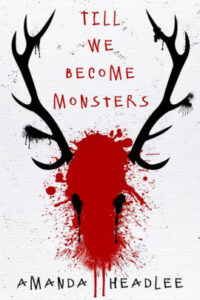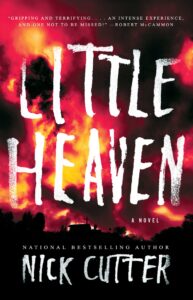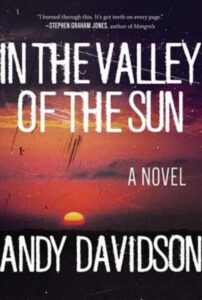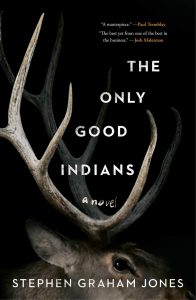Across the world of fiction, it’s hard to argue that there are few settings more iconic or emblematic than the American West. Rich in history and mythology alike, the West has long remained a fixture of our collective awareness, and for good reason. There are heroes and sagas, adventures and heartbreak aplenty west of the mighty Mississippi.
But what about horror?
Well, to mangle an old saw: there’s scares in them thar hills. You just have to know how to find them.
Stories about the American West have always been rife with scares and horrors sure to delight and repulse even the most hardened of horror fans, from pulpy matinee fare like Billy the Kid Vs. Dracula to literary classics like Blood Meridian, but by taking what works and leaving what doesn’t, writers today are riding into the sunset with some of the most breathtaking and terrifying fiction in recent memory.

Coyote Songs by Gabino Iglesias
Holy hell, but I absolutely love good crime-horror, and the fact of the matter is that Gabino Iglesias does it better than damn near anybody in the game (and, let’s be honest, has been doing so for years). Coyote Songs is a full-force knockout punch of a novel. Sporting six intertwining storylines concerning a host of different characters, this book doesn’t so much explore the American southwest and the border (also known as La Frontera) as interrogates them with a car battery and a set of jumper cables.
The book concerns itself with a variety of different experiences across La Frontera, and is made all the better for its mosaic narrative. It’s a ferocious, unsettling, angry book, but for all its furies, it somehow never loses focus on the people trapped in the middle of all its twists and turns. There’s magic and demons, bloodshed, horror and humanity aplenty here, so if you’re ready to completely rewrite your understanding of what western-style horror can be and do, Coyote Songs might just be the ride you’ve been waiting for.

Till We Become Monsters by Amanda Headlee
Stories out of the west have always nurtured a strange, adversarial relationship with the wilderness. On one hand, it’s picturesque, gorgeous, and stunning in its natural beauty—no matter the season. On the other hand, nature is wild. Nature is hungry. Nature never stops trying to kill you.
Let’s get this out of the way right off the bat: for obvious reasons, I’ll never not be a sucker for a good story about people trapped alone in the wild. Snowbound, isolated, and deeply haunted, in a lot of ways, Amanda Headlee’s Till We Become Monsters exists outside of time and space. This is a story that could have happened at almost any point over the last two hundred years.
The story of a young man attempting to right very old wrongs on a hunting trip with his father and brother, Till We Become Monsters is a fantastic study of desperate people trapped in dire straits. Folklore, family, and fear permeate this book, and as the hunters’ situation grows increasingly strange and drastic, the wilderness seems to turn hostile and start to close in around them like a bear trap.

Little Heaven by Nick Cutter
There are a lot—and I mean a lot—of moving parts to Nick Cutter’s Little Heaven, but unsurprisingly, he manages to pull it off with aplomb.
The story of three hired guns amidst a cast of assorted desperate cultists, ne’er-do-wells and body horror freakouts, Little Heaven’s western genetics are on full display from the start: our three ostensible protagonists are all world-weary gunslingers with too much baggage and far too little patience to suffer fools lightly, thrust into the kind of situation that even they, with their histories of murder and mayhem, aren’t equipped to deal with.
Experiencing Little Heaven is like wading your way through a fucked-up Jonestown version of The Wicker Man that’s been spliced together with The Wild Bunch. The story is unnervingly eerie and apocalyptically violent in equal measure from the jump—brutal, unflinching and utterly grotesque. It’s a fascinating and gripping journey into the west’s dark, weird heart. Not to be missed.

The Queen of the Cicadas (La Reina de Las Chicharras) by V. Castro
Rife with tragedy and mystery and overflowing with the kind of pure, unadulterated humanity that only comes along once in a very long while, The Queen of the Cicadas is a modern western legend wrapped up in a Texas fever dream that you’ll wish never had to end. Ostensibly the story of two women (and one goddess of death) who find their stories interwoven in increasingly surprising and meaningful ways, The Queen of the Cicadas is a bloody, scary, staunchly anticolonial fable unlike anything you’ve read before.
Castro’s prose and plotting are nothing short of goddamned miraculous, slinking and twisting along, hypnotic as a stage magician’s patter or a rattlesnake atop shifting sands, lulling you into a dreamlike trance for just as long as they need to strike. Make no mistake about it, this is a heart-wrenching book, steeped in both lore and trauma, and like the best stories out of the west, the magic within its pages is perfectly braided with the humanity of the characters.

In the Valley of the Sun by Andy Davidson
Reading In the Valley of the Sun is a visceral experience. You can feel the blistering Texas sun baking deep into your skin with every turn of the page. Davidson’s prose is astonishing and stark in its beauty, seemingly sandblasted by the western wastes down to its purest form. The desolation of the landscape as well as the characters are unmistakable and profoundly nuanced, and the violence, when it comes (which it always does), comes fast and vicious. The world this story takes place in is a ghastly and merciless one, unforgiving in both manner and scope, and it’s made all the better for it.
Travis, one of the novel’s two protagonists, is, in true Western fashion, both kind of an old-school cowboy, and (more importantly to the story), a Very Bad Man. He lies, he cheats, he steals, and he kills. And that was all long before he ever got turned into a vampire. Though, like some of the best Western protagonists out there, there might be some small hope for his sorry, damned ass yet—but of course, everything comes with a cost.

The Hunger by Alma Katsu
A wagon train drives stubbornly across the West, heading toward—they think—better days and brighter futures. They’re tired, they’re hungry, and maybe more than anything, they’re ready to be done, no matter how hopeful they might feel in the moment.
It’s been a hard winter for the Donner Party.
The story of the Donner Party’s ill-fated journey across the west is already scary enough, but Alma Katsu’s inventive take on it ratchets up the tension and fear a hundred-fold, with the truest evils in The Hunger lying squarely at the intersection of the supernatural and the terribly, wretchedly human. In every way that counts, this novel is a vivid and grisly deconstruction of a lot of the myths we like to tell ourselves about the American West… and our own identities. Who are we really when no one’s looking? Well, if Alma Katsu’s to be believed, we all might be a bit more monstrous than we let on.

The Only Good Indians by Stephen Graham Jones
Like peanut butter and jelly or bacon and eggs, guilt and the west are one of those pairings that just works, and nobody in recent memory has dug deeper or more effectively into it than Stephen Graham Jones.
The story of Ricky, Cassidy, Lewis and Gabe, four Blackfeet men who find themselves haunted by the vengeful spirit of a mother elk they killed on a fateful hunting trip ten years previous, The Only Good Indians is a masterful examination of guilt, regret and vengeance in the west. But the book’s western connections go so much deeper, with the main characters’ struggle with identity, tradition, and ultimately, their place in the world around them threaded expertly through every chapter. Bloody and potent (both physically and emotionally), haunting and haunted, The Only Good Indians is one of those books that buries itself deep in your brain and refuses to let go.
***


















